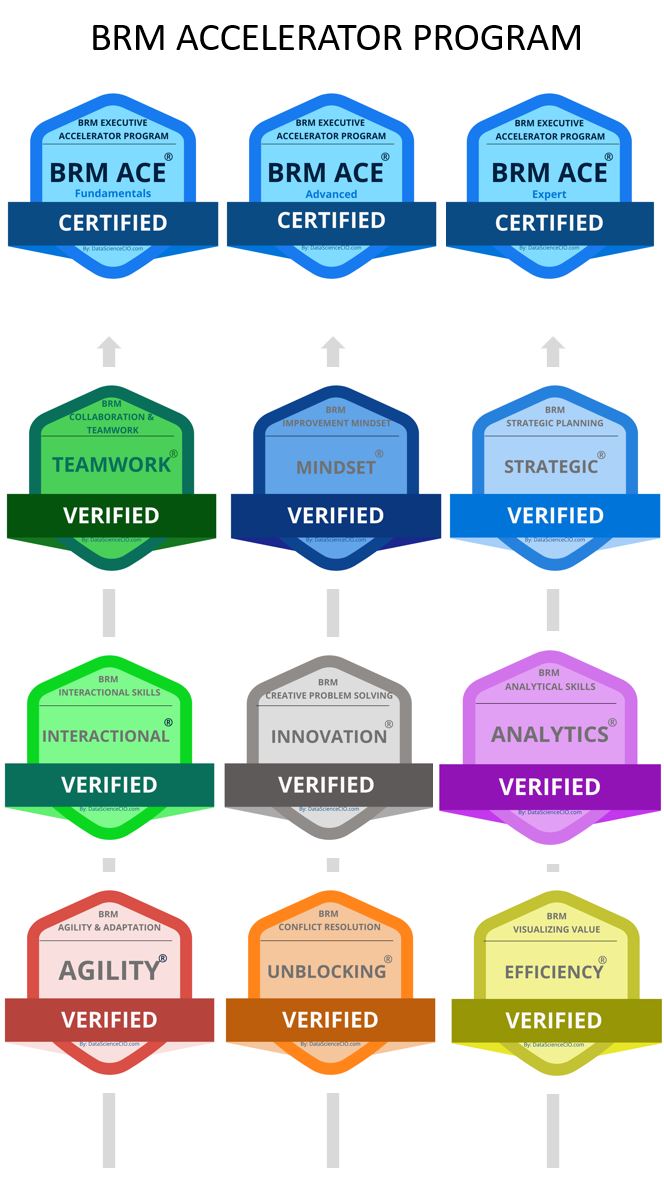Description
There is a reason that pilots take fast-track programs and leaders enroll in executive MBAs and that universities offer summer and winter accelerator programs—they work!
For those that can handle the pace, it’s a great way to fill up on knowledge and technique in a short amount of time.
The BRM Executive Accelerator Program is challenging. There are 10 assignments a week, in addition to weekly discussions and practical hand’s examples of the principles each week.
The benefit is that you have a complete view of how a BRM practitioner operates in a challenging and complex environment. You’re also exposed to the tools and techniques required for strategic BRM success.
Stop wasting time wondering what’s the best approach. Know confidently that the approach you’re taking has been tried and validated to be effective.
This coaching is provided by a Master of Business Relationship Management (MBRM®)!
Take your BRM game to the next level. Enroll today!
The package includes:
![]() 30-minute 1:1 coaching session every week
30-minute 1:1 coaching session every week
![]() 3 sessions are included with this package
3 sessions are included with this package
![]() Weekly daily contact with your coach via email on an as-needed basis
Weekly daily contact with your coach via email on an as-needed basis
Curriculum
![]() You want a proven approach to fast-track your ability to be a BRM practitioner.
You want a proven approach to fast-track your ability to be a BRM practitioner.
![]() You enjoy discussing specific challenges, not only the theoretical constructs of a challenge leading to options for resolution.
You enjoy discussing specific challenges, not only the theoretical constructs of a challenge leading to options for resolution.
![]() You operate in a complex environment and require the experience of a Master of Business Relationship Management (MBRM®).
You operate in a complex environment and require the experience of a Master of Business Relationship Management (MBRM®).
![]() You already have a foundational understanding of BRM principles and are looking to advance your career.
You already have a foundational understanding of BRM principles and are looking to advance your career.
![]() You have good knowledge of BRM concepts but want to focus on the application of those techniques in the wild, e.g., skills you won’t get from reading a book.
You have good knowledge of BRM concepts but want to focus on the application of those techniques in the wild, e.g., skills you won’t get from reading a book.
- Teamwork skills are the ability to work collaboratively with others towards a common goal. It is essential for strategic BRMs to possess this skill as they must work closely with different departments within an organization to develop and execute effective strategies that align with the overall business objectives.
- Interactional skills refer to the ability to communicate effectively and build relationships with stakeholders at all levels. Strategic BRMs must be skilled communicators to establish trust and credibility with stakeholders, understand their needs and expectations, and effectively convey the organization’s strategic priorities.
- Agility skills are the ability to adapt and respond quickly to changes in the business environment. Strategic BRMs must be agile to identify emerging trends and adjust their strategies accordingly to stay ahead of the competition.
- Unblocking skills refer to the ability to identify and remove barriers that hinder progress toward strategic goals. Strategic BRMs must be adept at unblocking to ensure that the organization can execute its strategies effectively and efficiently.
- Innovation skills are the ability to think creatively and come up with new ideas to solve business problems. Strategic BRMs must possess innovation skills to identify new opportunities and develop innovative solutions that can drive the organization forward.
- Mindset skills are the ability to think strategically and act with a customer-centric approach. A strategic BRM must possess a strategic mindset to align IT initiatives with business strategies, understand the customer’s needs, and act as a trusted advisor to business partners.
- Efficiency skills refer to the ability of a strategic Business Relationship Manager (BRM) to optimize processes and workflows to enhance productivity, reduce costs, and increase customer satisfaction. This skill is vital for a strategic BRM as it helps them to streamline business operations, maximize the value of resources, and deliver high-quality services to internal and external stakeholders. By being efficient, a BRM can reduce waste, eliminate redundancies, and ensure that the business operates smoothly, resulting in a more agile and adaptable organization.
- Analytics skills refer to the ability of a strategic BRM to collect, analyze, and interpret data to identify patterns, trends, and insights that can be used to make informed decisions. This skill is vital for a strategic BRM as it helps them to understand the business landscape, anticipate future trends, and align business objectives with customer needs. By leveraging analytics, a BRM can gain a deeper understanding of customer behavior, preferences, and pain points, which can be used to develop targeted solutions that drive business growth and improve customer satisfaction.
- Strategic skills refer to the ability of a BRM to think long-term and align business goals with customer needs, industry trends, and emerging technologies. This skill is vital for a strategic BRM as it helps them to identify opportunities for innovation, anticipate market shifts, and position the business for future success. By being strategic, a BRM can create a vision for the business that is grounded in reality, adaptable to change, and focused on delivering value to customers. They can also help the organization make informed decisions, prioritize initiatives, and allocate resources effectively, resulting in a more agile response to change.
Change management is a collective term for all approaches to prepare, support, and help individuals, teams, and organizations in making organizational change. Drivers of change may include the ongoing evolution of technology, internal reviews of processes, crisis response, customer demand changes, competitive pressure, acquisitions and mergers, and organizational restructuring. It includes methods that redirect or redefine the use of resources, business processes, budget allocations, or other modes of operation that significantly change a company or organization. Organizational change management (OCM) considers the full organization and what needs to change, while change management may be used solely to refer to how people and teams are affected by such organizational transition. It deals with many different disciplines, from behavioral and social sciences to information technology and business solutions.
Strategic road mapping is a process for creating a clear and structured plan for achieving a company or organization’s long-term goals. It involves identifying key milestones, setting priorities, and outlining the steps necessary to reach those milestones over time. Strategic road mapping is particularly useful for organizations that need to navigate complex and rapidly changing environments, such as those faced by companies in industries like technology, healthcare, or energy.
Value Proposition is a promise of value to be delivered, communicated, and acknowledged. It is also a belief from the customer about how value (benefit) will be delivered, experienced, and acquired.



